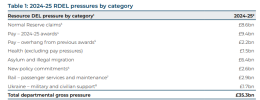When I hear of "private finance" input into rail projects being made mention of in threads on a number of websites, I ask myself if I had a position of note in a multinational finance organisation, would I be committing billions of pounds sterling into a rail network that can be disrupted by rail union industrial action by the major two rail unions over a number of years?
I imagine the deal would be based on an availability payment. The infrastructure company would agree to provide and probably maintain the infrastructure, and be paid a certain amount for every hour or day it was made available to the operator. This means the infrastructure company takes the cost risk if their infrastructure fails or costs more to maintain than they expected, which in principle incentivises them to look at whole life cost instead of just building as cheaply as possible.
This is of course very over-simplified, one of the extra complications being that the infrastructure company would almost certainly want a track access charge to cover wear and tear according to the number of trains using it. But that would probably be cost-neutral, so the infrastructure provider doesn't care how many trains operate. Thus the government remains liable for the loss of revenue due to industrial action or other failure of the operator to run the trains.
Some will have noticed that this is exactly the model for the much-derided PFIs in hospitals and schools. The key to this is being sure that the efficiencies that the private sector brings to the process outweigh the extra costs such as profit and having to pay more to borrow than the government does. And also to ensure that there are no silly charges sneaked into the operating period, like what hospitals sometimes have to pay to have the infrastructure company change a light bulb.




